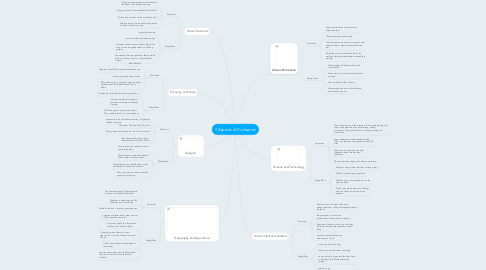
1. Social Structures
1.1. Sumerians
1.1.1. A king was later erected and he became the base of the Sumerian society
1.1.2. King gave land to the wealthy and his officials
1.1.3. Fathers had control over their children's life's
1.1.4. Widows were to be the head of the house until the child came to age
1.2. Shang/Zhou
1.2.1. agricultural society
1.2.2. most time went into tending crops
1.2.3. sometimes farmers were called to fight in the army or work alongside slaves on building projects
1.2.4. the wealthy elite had spare time that could be used to hunt as a sport or collect valuable objects
2. Economy and Trade
2.1. Sumerians
2.1.1. Self-sufficient
2.1.2. Temples of their Gods controlled their economy
2.1.3. Economy based on agriculuture
2.1.4. Were able to grow a variety of crops by using irrigation from the Eupharates and Tigris Rivers
2.2. Shang/Zhou
2.2.1. The people of the Shang were mostly farmers.
2.2.2. slaves performed all economic functions of society in the Shang Dynasty.
2.2.3. The Zhou people were mostly traders. They traded bronze, iron, and weapons
2.2.4. Peasants did most of the work during the Zhou Dynasty.
3. Religion
3.1. Sumerians
3.1.1. Polythiestic
3.1.2. Their main God was Enlin, Sky God
3.1.3. Every village and city had it's own God to worship
3.1.4. they believed that kings were a representation of Gods on Earth
3.2. Shang/Zhou
3.2.1. Their religion was centered around ancestor worship
3.2.2. Peoples' tombs contained valuable items made of bronze or jade,
3.2.3. They believed in an afterlife where a ruler still needed his riches and servants.
3.2.4. They used oracle bones to ask their ancestors for advice.
4. Geography and Agriculture
4.1. Samerians
4.1.1. The Sumerians lived in Mesopotamia also known as the Fertile Cresent
4.1.2. They have a water source of the Euphrates and Tigris Rivers
4.1.3. Fertile land which is great for growing crops
4.1.4. Lagoons and lakes held a great amount of fish and other resources
4.2. Shang/Zhou
4.2.1. long rivers, fertile soil, temperate climates, and isolated valleys
4.2.2. Chang Jaing and Huang He rivers deposit rich soil in the valleys from anual floods.
4.2.3. China's first civilizations developed in river valleys.
4.2.4. the mountains, desert, and hills protected them from invasion, which kept them isolated.
5. Arts and Education
5.1. Sumerians
5.1.1. Used a combination of writing forms called cuneiform
5.1.2. These coins were made of clay
5.1.3. The clay tokens were used for money as well and were kept in bag to prevent theft and loss
5.1.4. Sculptures came in sizes which led to the making of temples where people were able to worship
5.2. Shang/ Zhou
5.2.1. They developed Chinese writing with oracle bones.
5.2.2. Artists made a lot of objects with bronze and jade.
5.2.3. Their art reflected their cultures.
5.2.4. Monumental statues of rulers reflected its civilization's power.
6. Science and Technology
6.1. Sumerians
6.1.1. They used many tools like irrigation, the slay, the plough, clay bricks, the potters wheel, metal-working, writing, accounting, filing, glass and lamp making, weaving and much more.
6.1.2. Used mathematics and based everything of 60, and that is how we got 60 secs and 60 mins
6.1.3. they made a book on how to help diagnose certain diseases and sicknesses
6.1.4. Doctors used bandages, pills, creams and more
6.2. Shang/Zhou
6.2.1. They built huge, stable structures such as tombs
6.2.2. The Zhou started using chopsticks
6.2.3. The Shang may have created one of the first currencies.
6.2.4. The Zou people learned to craft things with iron. These include tools and weapons.
7. Government and Leaders
7.1. Sumerians
7.1.1. Each city had a city-state which were independent from others and frequent warfare brokeout
7.1.2. Temples used to control the government but then it led to kingship
7.1.3. Kings would have to not only control their are but also make sure agriculture would thrive
7.1.4. Sumerians had laws known as Hammurabi's Code
7.2. Shang/Zhou
7.2.1. monarchy, ruled by a king
7.2.2. the king was the lawmaker and judge
7.2.3. no one dared to argue with the king's laws or else they'd be killed by the king's soldiers.
7.2.4. ruled by force
